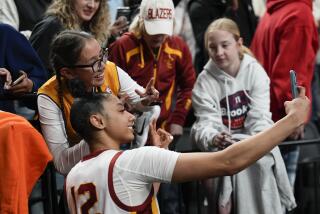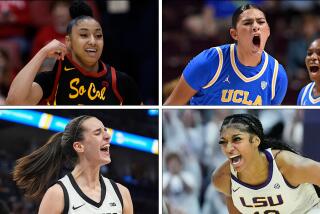She’s Going the Extra Degree
- Share via
As she slides a hand through her dreadlocked hair, Monique Currie smiles shyly and ponders the question.
No, not about deciding to come back and play basketball for Duke, even though she had already graduated -- with degrees in public policy and African American studies.
But whether she still thinks it was the right choice.
The 6-foot guard-forward had a tremendous 2004-05 season, averaging 17.5 points and 7.1 rebounds. She was named to four All-American teams and was the Atlantic Coast Conference women’s player of the year. She was a potential WNBA lottery pick, a definite first-round selection.
Even though Duke figured to be a national title contender this season -- and the 20-1 Blue Devils, despite being upset at home Sunday by ACC rival North Carolina, are that -- there were no guarantees.
Currie, however, said there was unfinished business, both on and off the court.
She couldn’t let go of the 11-point, four-for-18 shooting performance she turned in against Louisiana State in the NCAA tournament, perhaps costing Coach Gail Goestenkors’ Duke team a berth in the Final Four.
And there was the classroom. Before June, Currie expects to earn her master’s degree from Duke’s school of humanities.
“A lot went into the actual decision,” Currie said of returning to school. “The lure of having a really good team this year; Coach G bringing in some nice recruits; having Lindsey [Harding] back. And the college atmosphere is something I’ll cherish forever, and I wanted to be part of it again, since I had the opportunity.
“I figured the WNBA, if it were meant to be, then it will be there for me this year. And I had the chance to work on my master’s, which is something I always wanted to work toward, whether I was in the WNBA or after I was done.”
Currie, 22, had a fifth year of eligibility because she redshirted her sophomore year after tearing ligaments in her left knee. But she was not going to spend all day in the gym. Her schedule includes classes that cover theory of coaching, violence in public schools, history of poverty and sports-related injuries “where we learn to read MRIs and stuff like that.”
All she will have left to do is an independent-study class.
“I knew that coming to Duke, such a prestigious school, that academics was a serious thing here,” she said. “The chances of being a professional player aren’t that great. So the opportunity to have a degree from such a university, I think a lot of athletes come here to take advantage of that.
“I would like to think, even if I had a million-dollar contract dangling in front of me last year, I still would have chosen to come back.”
Other players call Currie an inspiration.
“Monique is a great leader by example,” Harding said. “When a Wade Trophy candidate is diving for loose balls, you want to do it too. I wanted her to stay but told her to do what’s best for her at that time. And she made the smart decision, in my opinion. She will go to the WNBA with a master’s and, hopefully, a national championship, and that’s not a bad combination.”
Goestenkors said and she’d tried hard to make sure Currie could make an informed decision.
“I was really OK with whatever decision she made and was not trying to convince her one way or the other. Because ‘Nique is not someone you can con,” Goestenkors said.
“I was very honest with her about getting her as much information as I could, and did not want her to have regrets either way. She is a mature, thoughtful person and would make a smart decision, not an emotional decision.”
Currie’s statistics have dipped slightly this season. She’s leading the team in scoring, but at 15.2 points a game, more than a two-point drop. But she doesn’t have to do as much as she did last season. The Blue Devils have thrived on depth and balanced scoring, instead of depending on one or two stars.
And don’t think WNBA interest has waned. Currie, who combines a strong physique with quickness, is projected as a top-five pick, and possibly No. 2 after LSU’s Seimone Augustus.
According to one Western Conference scout who has watched Currie several times in the last two seasons, “She can play both guard positions, can carry a team and is a leader. She’s more a scorer than shooter. Her outside shooting consistency needs work but that’s her only weakness.”
According to WNBA officials, the Sparks’ Lisa Leslie and Indiana’s Tamika Catchings are the only active players with master’s degrees.
Currie should be the third. And although her next career will start a year late, later than it could have, she said it would be worth the wait.
“This definitely feels like the right decision,” Currie said. “I’m definitely glad I came back.”
More to Read
Go beyond the scoreboard
Get the latest on L.A.'s teams in the daily Sports Report newsletter.
You may occasionally receive promotional content from the Los Angeles Times.










